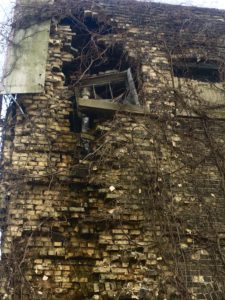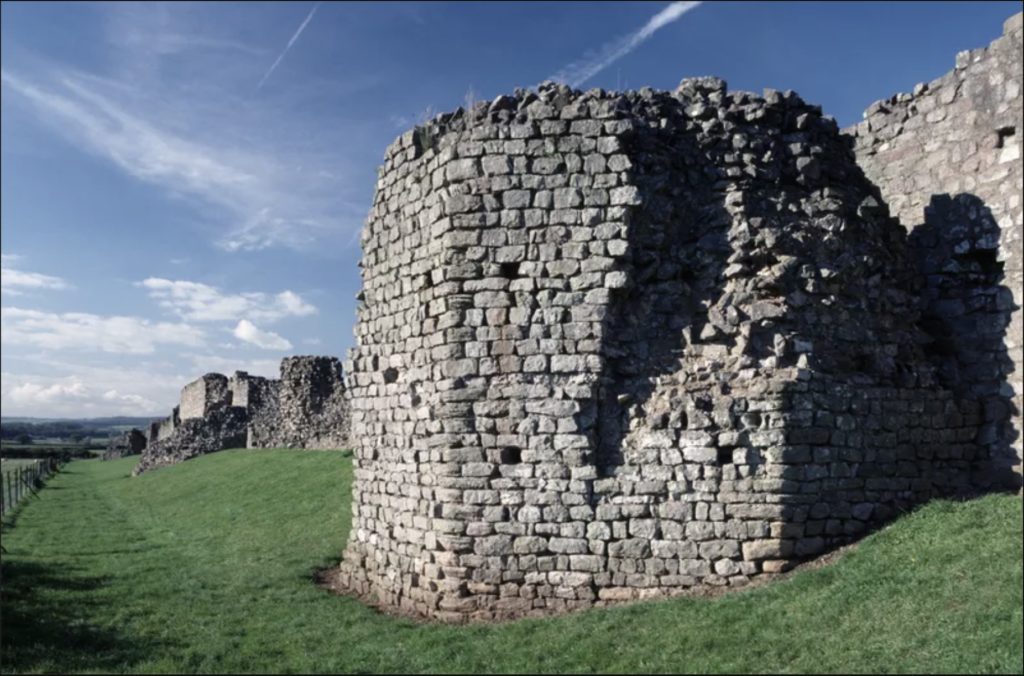
Richard Fahey’s account of the inspiration behind this translation with accompanying photographic art can be accessed here.
Old English Ruin
Wrætlic is þes wealstan, wyrde gebræcon;
burgstede burston, brosnað enta geweorc.
Hrofas sind gehrorene, hreorge torras,
hrungeat berofen, hrim on lime,
scearde scurbeorge scorene, gedrorene,
ældo undereotone. Eorðgrap hafað
waldend wyrhtan forweorone, geleorene,
heardgripe hrusan, oþ hund cnea
werþeoda gewitan. Oft þæs wag gebad
ræghar ond readfah rice æfter oþrum,
ofstonden under stormum steap geap gedreas.
Wonað giet se …num geheapen,
fel on
grimme gegrunden
scan heo…
…g orþonc ærsceaft
…g lamrindum beag
mod mo… …yne swiftne gebrægd
hwætred in hringas, hygerof gebond
weallwalan wirum wundrum togædre.
Beorht wæron burgræced, burnsele monige,
heah horngestreon, heresweg micel,
meodoheall monig mandreama full,
oþþæt þæt onwende wyrd seo swiþe.
Crungon walo wide, cwoman woldagas,
swylt eall fornom secgrofra wera;
wurdon hyra wigsteal westen staþolas,
brosnade burgsteall. Betend crungon
hergas to hrusan. Forþon þas hofu dreorgiað,
ond þæs teaforgeapa tigelum sceadeð
hrostbeages hrof. Hryre wong gecrong
gebrocen to beorgum, þær iu beorn monig
glædmod ond goldbeorht gleoma gefrætwed,
wlonc ond wingal wighyrstum scan;
seah on sinc, on sylfor, on searogimmas,
on ead, on æht, on eorcanstan,
on þas beorhtan burg bradan rices.
Stanhofu stodan, stream hate wearp
widan wylme; weal eall befeng
beorhtan bosme, þær þa baþu wæron,
hat on hreþre. þæt wæs hyðelic.
Leton þonne geotan
ofer harne stan hate streamas
un…
…þþæt hringmere hate
þær þa baþu wæron.
þonne is
…re; þæt is cynelic þing,
huse …… burg….
Old English Ruin from edition by Bernard Muir, The Exeter Anthology of Old English Poetry, Volume I, Exeter: University of Exeter Press, 2000.
A reproduced edition is also available online.

“The Ruins of Time”: A Modern English Translation by Richard Fahey
Wondrous are these wall-stones,
broken by fortune, the citadels crumbled,
the work of giants ruined.
The roofs are collapsed,
the towers tumbled, the pillars bereft.
Ice on the arch scarred the storm-wall,
old, eroded, weathered and worn.
The earth’s grasp keeps the master artisans,
deceased and decayed
in the firm grip of the ground,
until a hundred generations of human peoples have departed.
Often this wall, lichen-grey and rust-coated,
endured one regime after another,
withstood under storms,
steep and curved—it fell.
… Yet it wanes… hewn…
fell on… grimly ground down…
shone… the well-crafted ancient-work…
mud-covered and bowed…
the mind… swiftly bent,
bedecked with rings,
bound with strong purpose,
wall-stones wondrously wired together.
Bright were the city-halls,
the many bath-houses,
the high horned-adornments,
the great sound of war,
the many mead-halls full of human-pleasures,
until fortune changed that dramatically.
Slaughter destroyed far and wide,
the days of woe came,
death seizes all of those brave men,
their fortification became deserted places,
their strongholds crumbled,
those troops who would should have repair them were dead in the ground.
Therefore these houses have decayed,
and this gabbled structure sheds its tiles,
the roof of ringed-wood.
This place has fallen into ruin with broken buildings.
Once there were many men,
glad-minded and gold-bright, adorned with splendor,
proud and wine-drunk, shown in their battle-armor.
One could gaze on the treasure,
on silver, on carved jewels,
on wealth, on possession,
on precious stones,
on this bright city in a broad kingdom.
Stone-houses stand,
the hot streams whirl in a wide welling,
the wall contains all in its bright bosom,
where the baths were, hot in its core.
That was pleasant.
Let then pour fourth…
over grey stone, hot streams…
hot ring-pool…
where the baths were….
then is…
That is a kingly thing…
house…
city….
Recitations of the Ruin
Richard Fahey
PhD Candidate
University of Notre Dame
